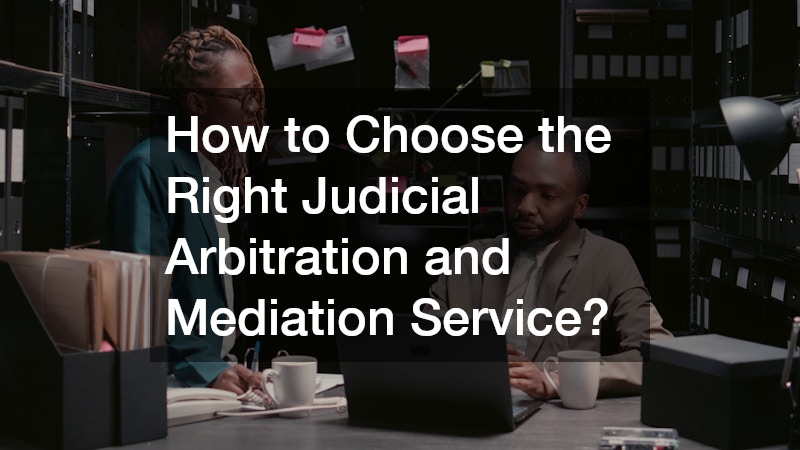In this article, we will explore the invaluable role that Judicial Arbitration Mediation Services (JAMS) play in resolving legal disputes. We will address key questions and provide insights on how these services can be of assistance to you.
How Do Judicial Arbitration and Mediation Services Work?
Understanding the Process
Judicial arbitration and mediation services offer structured processes to resolve disputes outside of court. These services typically begin with an initial consultation to understand the dispute’s nature and to tailor an appropriate resolution approach.
During arbitration, an impartial arbitrator hears both sides and makes a decision, which is often binding. Mediation, on the other hand, involves a neutral mediator who helps facilitate discussion between the parties to reach a voluntary agreement.
Both processes are designed to be less formal and adversarial than traditional litigation, providing parties with a more collaborative approach to resolving their issues. This allows for more flexibility and creative solutions that a court might not be able to provide.
Key Differences Between Arbitration and Mediation
Arbitration and mediation are distinguished by the roles and outcomes they produce. In arbitration, the arbitrator plays a more active role in determining the outcome, whereas in mediation, the mediator assists the parties in finding a mutual resolution.
Arbitration decisions are typically binding and enforceable in the same manner as a court judgment, making it a more formal process. Conversely, mediation relies on collaboration and agreement, with the result being non-binding unless formalized in a contract.
The choice between the two often depends on the nature of the dispute and the desired level of control over the outcome. Typically, mediation is preferred when maintaining relationships is a priority, while arbitration is chosen for its definitive, legal conclusion.
What Are the Benefits of Using Judicial Arbitration and Mediation Services?
Cost-Effectiveness
Judicial arbitration and mediation services can significantly reduce legal expenses compared to traditional litigation. By minimizing costly court fees and lengthy procedures, these services become an attractive option for many.
The streamlined nature of these alternative dispute resolution (ADR) techniques helps avoid excessive lawyer fees. Parties typically share the costs of the arbitrator or mediator, resulting in a more affordable resolution process.
This cost efficiency makes ADR accessible to a wider range of parties, from individuals to large corporations. Businesses particularly benefit as they can allocate resources more effectively, focusing on operations rather than legal disputes.
Time-Saving Advantages
One of the most compelling advantages of arbitration and mediation is the significant time savings. Traditional court proceedings can drag on for months or even years, while ADR methods often conclude in weeks or days.
This expedited nature allows for quicker resolutions, freeing parties from prolonged uncertainty and enabling them to move forward. Timeliness is particularly beneficial when addressing urgent disputes that require swift action.
Furthermore, the availability of flexible scheduling and the ability to select an arbitrator or mediator of choice enhance the efficiency of the process. This is a stark contrast to court cases, where parties must work within the constraints of the judicial calendar.
When Should You Consider Judicial Arbitration and Mediation Services?
Types of Disputes Suitable for Arbitration or Mediation
Judicial arbitration and mediation services are most beneficial for certain types of disputes. These include commercial disputes, contractual disagreements, family law issues, and even workplace conflicts.
These services are particularly well-suited for situations where both parties seek a private resolution process. The confidentiality and informality offer a space for open discussion, making it ideal for cases with sensitive elements.
Moreover, disputes requiring specialized expertise, such as intellectual property cases, often benefit from ADR due to the ability to select arbitrators with relevant industry experience. This ensures a more informed and tailored resolution process.
Indicators That It’s Time to Seek ADR
Certain indicators suggest that pursuing judicial arbitration and mediation might be more advantageous than court litigation. One key sign is when traditional negotiation efforts have reached an impasse without yielding expected results.
Another indicator is when preserving the working relationship between parties is a priority, as mediation encourages cooperation and dialogue. In addition, complex disputes with numerous technical details might benefit from the tailored approach of arbitration.
The desire to maintain confidentiality and keep the proceedings out of the public domain is also a strong motivator for seeking ADR. These factors help parties achieve efficient resolutions while retaining control over the process.
How to Choose the Right Judicial Arbitration and Mediation Service?
Factors to Consider When Selecting a Service
Choosing the right judicial arbitration and mediation service requires careful consideration of several factors. Experience and the reputation of the service provider are critical elements to assess.
The background and expertise of potential arbitrators or mediators should be relevant to the specific nature of the dispute. This ensures informed decisions and effective facilitation of discussions.
Additionally, the service provider’s track record in handling similar cases can be an invaluable indicator of their effectiveness. By aligning expertise with the dispute’s requirements, parties can maximize the chances of a successful resolution.
Questions to Ask Potential Providers
When selecting a judicial arbitration and mediation service, asking the right questions is crucial in making an informed decision. Consider inquiring about the provider’s experience with cases similar to yours and their success rates.
It is also wise to ask about the specific qualifications and training of the arbitrators or mediators involved. Understanding their approach to resolving disputes can help evaluate if their style aligns with your expectations.
Lastly, asking about costs, schedules, and the estimated duration of the process can help assess practicality. This comprehensive inquiry ensures choosing a service that meets both your procedural and financial needs.


